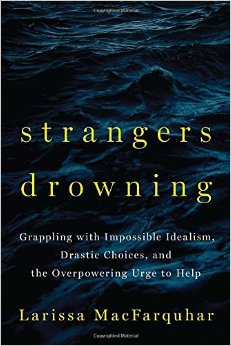[box type=”note” align=”” class=”” width=””]Strangers Drowning: Grappling with Impossible Idealism, Drastic Choices, and the Overpowering Urge to Help By Larissa MacFarquhar Penguin Press, 2015 320 pp., $27.95[/box]
By Bill Williams
Sue Hoag and her husband, Hector, felt such compassion for abandoned or sick children, that they adopted 20 boys and girls on top of their own two children.
“They were always exhausted and always broke and it was rare that they had any time alone, but they knew that they were needed: they could give love and food and shelter to children who needed those things and who loved them back. They were doing God’s work.”

One of the most moving stories in this book involves a man named Baba who opened a leper colony in India, inspired by the examples of Jesus and Saint Francis. His work eventually attracted more volunteers. Other services were added, including schools for blind children and the deaf, an orphanage and a home for the aged. Eventually, several thousand people, including hundreds of lepers, came to live in the village Baba had created.
These stories are examples of extreme giving by so-called “do-gooders,” a phrase the author uses throughout this absorbing book.
But not all do-gooders focus on human suffering. Aaron Pitkin [a pseudonym] devoted his life to reducing the suffering of chickens, noting the horrid conditions on factory farms, where the birds live in tiny cages in constant pain.
The author, Larissa MacFarquhar, is a polished writer, having served for a number of years as a staff writer for The New Yorker magazine, where some of the material in this book first appeared.
The book’s title refers to the conundrum that asks what you would do if your mother were drowning at the same time that two nearby strangers were drowning. Would you save your mother or the two strangers, rationalizing that saving two lives is better than saving one? The author does not offer an opinion.
When kidney donations to nonrelatives first became popular, doctors found the practice to be bizarre and identified donors as “screwballs.” Nevertheless, kidney donations to strangers have increased in recent years.
The apostle of modern do-gooders is Princeton Professor Peter Singer, who has written a number of books on the subject, most recently “The Most Good You Can Do: How Effective Altruism Is Changing Ideas About Living Ethically.” MacFarquhar and Singer each cite cases in which married couples take high-paying jobs so they can give most of what they earn to charity. Others decide against having children so the money they would have spent raising their offspring can be given to charity.
Some do-gooders are inspired by religion, while others identify as atheists and want nothing to do with religion.
The book credits the philosopher Susan Wolf with the idea that “a morally perfect person would be an unappealing, alien creature, driven not by the loves and delights of ordinary people, but by an unnatural devotion to duty. In a life devoted only to duty, there’s no room for art and little for enjoyment.”
MacFarquhar briefly weighs what would happen if everyone became a do-gooder or, alternatively, if no one followed that path. She says that the example of “these strange, hopeful, tough, idealistic, demanding, life-threatening and relentless people” allow others to see what is possible.







